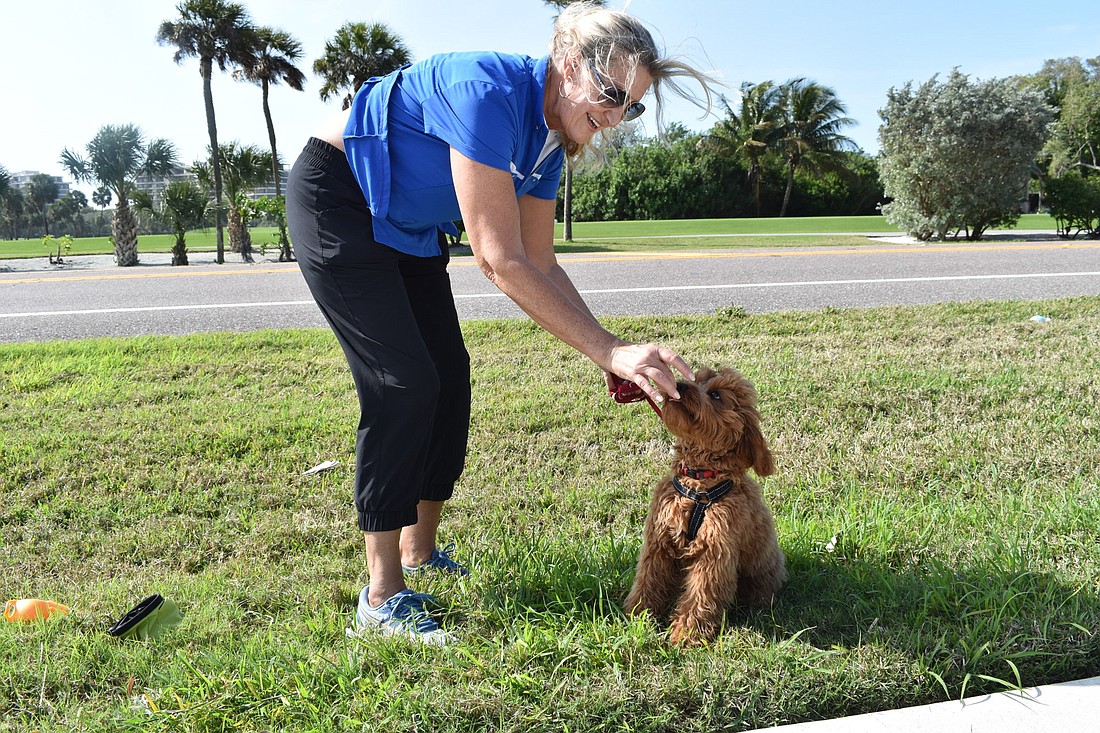- March 16, 2025
-
-
Loading

Loading

Kelly Ermold was walking a client’s dog this month along Gulf of Mexico Drive on a picture-perfect morning in Longboat Key while wishing for an even better route.
Finn, a 5-month-old Cavapoo, enjoys walking along the sidewalk but would probably enjoy the occasional unleashed burst of speed. Without leaving town, the only place that's allowed is Bayfront Park’s fenced dog park.
“It’s a shame,” Ermold said. “I wish they could have just like a quarter of a mile because they could let it go where you throw the ball.”
Dog owner and north-end Longboat Key resident Paul Hylbert understands the need to protect marine life and shore birds but mentioned how other parts of Florida and California offer dog beaches.
“We really need a bigger area, ideally,” Hylbert said, adding that there are dog-friendly locations elsewhere, but they are miles away.
“It’d be good if we had a place on the beach several hundred yards long where the dogs could run free and play,” Hylbert said.
Plus, Ermold explained why many of her clients don’t allow her to take their dogs to Bayfront Park.
“A lot of my clients, because of fleas and germs and diseases, they don’t allow me to take them there,” Ermold said.
Dogs must be on a leash everywhere else in the town. Longboat Key’s code also mandates dogs be on a leash that is no longer than 8 feet.
Pets are also not legally allowed on the beach in Longboat unless it is a service animal.
“I always used to think, ‘what’s the big deal with a dog on the beach?’” Longboat Key resident and dog owner Maureen Merrigan said. “And then, the beach volunteer program, we had an update on why that ordinance is in place and why it’s important.”
Shorebird nesting season started earlier this month and sea turtle season begins in May. The town is also in the process of increasing marine life protections because of Longboat Key's higher sea turtle disorientation rate compared to other nearby municipalities.
“When they see a dog, they see it as a predator, and then what happens is they end up using extra energy that they should be using for nesting or for their migration,” Merrigan said.
The Longboat Key Police Department has received an influx of calls about dogs on the beach. Longboat Key Deputy Police Chief Frank Rubino explained the difference between how service dogs are allowed on the beach while therapy dogs are not.
“A therapy dog doesn’t necessarily fit the criteria because anybody can call their dog a therapy dog if it makes them feel good, but the service dog is actually a trained dog for a specific ailment or disability,” Rubino said.
Rubino said it is a second-degree misdemeanor to misrepresent a dog as a service dog. However, Rubino said enforcement can be challenging.
“There are people out there with service dogs that might not have an obvious disability, and we can’t go up there and ask them what their disability is,” Rubino said. “If [someone] sees somebody that they feel might not be disabled, [it] doesn’t mean they’re not disabled.”
There is also the possibility of boaters with dogs on board. Many times, the dogs have to relieve themselves at some point or another.
“Sometimes people are having dogs run around on Greer [Island] to kind of relieve themselves,” Merrigan said. “Unless the owner is really picking up after them, you’re ending up with not only dogs around the seabirds, but you’ve got dogs that are defecating on the beach.”
Since August 2020, Rubino said the Longboat Key Police Department has received 43 calls categorized as dog complaints. It includes six warnings of dogs on the beach.
To report illegal dog behavior, call the police department's non-emergency number at 941-316-1201.